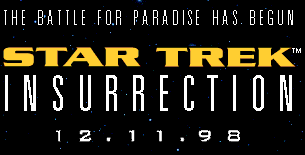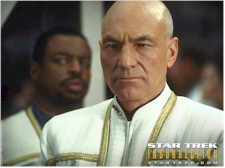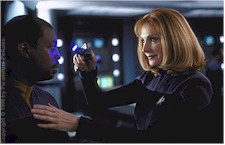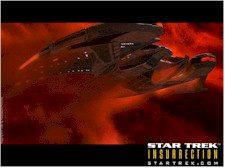|
| |
Star Trek - Insurrection
Review by Eddie Cockrell
Posted 11 December 1998
 |
|
Directed by Jonathan Frakes Starring
Patrick Stewart, Jonathan Frakes, B
rent Spiner, Levar Burton, Michael Dorn,
Gates McFadden, Marina Sirtis,
F. Murray Abraham, Donna Murphy,
and Anthony Zerbe
Written by Michael Piller,
from a story by Rick Berman and Piller |
In Star Trek: Insurrection (the colon’s in
the press material but not on the title card of the film itself), viewers will learn that
one of the seven principle officers of the starship Enterprise was designed to be -- among
a lot of other things -- an emergency flotation device, how to spot telltale signs of the
Klingon version of puberty, and the best headdress for a diplomatic reception honoring a
diminutive race new to the currently shaky Federation of Planets.
 If these
developments means nothing to you, this movie probably isn’t the best place to start
learning about the durable Star Trek phenomenon, which since it’s creation by Gene
Roddenberry in the 1960s boasts over a billion dollars in worldwide earnings generated by
nine films, a handful of television series and some 40 best-selling novels (for a quick
jumpstart try film #7, the 1994 entry Star Trek Generations, in which William
Shatner’s Captain Kirk and the original Enterprise crew give way to the stars of the
"Next Generation" television show, which has since been retired in favor of
these every-other-year movie events). For the faithful, however, Star Trek:
Insurrection continues the adventures of their heroes and heroines lovingly, if not
spectacularly. Yet if Insurrection feels more like the very big 180th
episode of the television program than a movie, blame the familiar
paradise-planet-in-peril story and not the unflagging and apparently very sincere
enthusiasm of the cast, who seem to be having a whole lot of fun expanding the boundaries
of their extended family. If these
developments means nothing to you, this movie probably isn’t the best place to start
learning about the durable Star Trek phenomenon, which since it’s creation by Gene
Roddenberry in the 1960s boasts over a billion dollars in worldwide earnings generated by
nine films, a handful of television series and some 40 best-selling novels (for a quick
jumpstart try film #7, the 1994 entry Star Trek Generations, in which William
Shatner’s Captain Kirk and the original Enterprise crew give way to the stars of the
"Next Generation" television show, which has since been retired in favor of
these every-other-year movie events). For the faithful, however, Star Trek:
Insurrection continues the adventures of their heroes and heroines lovingly, if not
spectacularly. Yet if Insurrection feels more like the very big 180th
episode of the television program than a movie, blame the familiar
paradise-planet-in-peril story and not the unflagging and apparently very sincere
enthusiasm of the cast, who seem to be having a whole lot of fun expanding the boundaries
of their extended family.
On a faraway planet, the peace-loving, agrarian Ba’ku are being observed by a
Federation survey team that includes Android Lieutenant Commander Data (Brent Spiner).
When Data’s commanding officer, Captain Jean-Luc Picard, arrives to investigate a
puzzling incident involving the android, a sinister plot emerges involving Federation
Admiral Dougherty (Anthony Zerbe) and Ru’afo (F. Murray Abraham), leader of the
Son’a, a key Federation ally. As it turns out, the Ba’ku have something the
Son’a want, and Picard must choose between disobeying a direct order from Dougherty
and violating the Prime Directive of the Federation, which explicitly forbids interference
with the natural development of new civilizations (Picard’s got a history of bucking
the system when it violates his sense of decency, one of the many traits that make him
such an interesting character).
 Intertwined with
the skullduggery are episodes both humorous and illuminating, which advance the
faithful’s knowledge of the interplay among Picard’s loyal crew. There’s
Commander William Riker (Jonathan Frakes, directing his second consecutive Star Trek
movie), who may or may not be rekindling something with Lieutenant Commander Deanna Troi
(Marina Sirtis), the ship’s half-human, half-Betazoid counselor. Then there’s
the resident Klingon, Lieutenant Commander Worf (Michael Dorn), recently returned from
duty on Deep Space Nine (another Star Trek television show) but in the grip of something
he can barely control. The Enterprise engineering officer, Lieutenant Commander Geordi La
Forge (Levar Burton), is testing his new electronic ocular implants on the Ba’ku
sunrise -- the first he’s ever seen -- while Doctor Beverly C. Crusher (Gates
McFadden) proves plucky when the group is threatened by deadly Son’a tagging devices
and is delighted to be feeling so refreshed. And Data himself learns more about being
human from a serene Ba’ku boy, Artim (11-year-old Michael Welch, who played the young
Niles on an episode of "Frasier" and that young Buddhist monk on the
Thanksgiving episode of "Chicago Hope"). Intertwined with
the skullduggery are episodes both humorous and illuminating, which advance the
faithful’s knowledge of the interplay among Picard’s loyal crew. There’s
Commander William Riker (Jonathan Frakes, directing his second consecutive Star Trek
movie), who may or may not be rekindling something with Lieutenant Commander Deanna Troi
(Marina Sirtis), the ship’s half-human, half-Betazoid counselor. Then there’s
the resident Klingon, Lieutenant Commander Worf (Michael Dorn), recently returned from
duty on Deep Space Nine (another Star Trek television show) but in the grip of something
he can barely control. The Enterprise engineering officer, Lieutenant Commander Geordi La
Forge (Levar Burton), is testing his new electronic ocular implants on the Ba’ku
sunrise -- the first he’s ever seen -- while Doctor Beverly C. Crusher (Gates
McFadden) proves plucky when the group is threatened by deadly Son’a tagging devices
and is delighted to be feeling so refreshed. And Data himself learns more about being
human from a serene Ba’ku boy, Artim (11-year-old Michael Welch, who played the young
Niles on an episode of "Frasier" and that young Buddhist monk on the
Thanksgiving episode of "Chicago Hope").
Even Picard himself is caught up in the planet’s magical spell, becoming smitten
with one of the Ba’ku, Anij (Donna Murphy) when he’s not resisting
Dougherty’s orders by pointing out the historical precedent of forced relocation and
the danger of giving Ru’afo too much power (in a previous century "petroleum
turned a petty thug into a world leader," he points out). Yet Anij has wisdom beyond
her years, soothing him by pointing urging the captain to "stop reviewing
yesterday" and "stop planning tomorrow."
 Detailing these
adventures further would spoil the fun of the movie, which, given the relative tame nature
of the conflict, is its strongest point. If the whole Ba’ku business seems vaguely
familiar from episodes gone by and the Son’a are not as fearsome an aggressor as has
been presented in previous adventures (despite some nice moments, Abraham seems
overwhelmed by his latex flaps and comes across as more prissy than menacing), so what?
The major plot twist gives each of the seven a chance to stretch out a bit within the
confines of their characters. In fact, what makes all of the post-Generations
movies so good almost by default is Stewart’s status as a genuine movie actor,
capable of commanding the screen in a way Shatner never could. That he makes the other six
better is a fact acknowledged by Sirtis in the press material: "Patrick engenders
that feeling in us… He’s our leader." Detailing these
adventures further would spoil the fun of the movie, which, given the relative tame nature
of the conflict, is its strongest point. If the whole Ba’ku business seems vaguely
familiar from episodes gone by and the Son’a are not as fearsome an aggressor as has
been presented in previous adventures (despite some nice moments, Abraham seems
overwhelmed by his latex flaps and comes across as more prissy than menacing), so what?
The major plot twist gives each of the seven a chance to stretch out a bit within the
confines of their characters. In fact, what makes all of the post-Generations
movies so good almost by default is Stewart’s status as a genuine movie actor,
capable of commanding the screen in a way Shatner never could. That he makes the other six
better is a fact acknowledged by Sirtis in the press material: "Patrick engenders
that feeling in us… He’s our leader."
Technically, the movie is a mixed bag, with the fine computer generated images (many of
which replace the physical model-making) and imaginative production design undermined
somewhat by the outdoor sets, which look precisely like the California wilderness
locations they are (one keeps looking for Charlton Heston to run through the background
being chased by those damned dirty apes). The film does manage to get the principals out
of their uniforms and into more relaxed garb.
There’s a popular theory involving the Star Trek films that holds the
even-numbered ones (The Wrath of Khan, The Voyage Home, The Undiscovered
Country, First Contact) as more successful than
the odd-numbered ones (The Motion Picture, The Search for Spock, The Final
Frontier, Generations). This would seem to bode ill for Insurrection,
but in the end the movie turns out to be as comfortable as an old sofa, balancing
predictability and surprise with the skill producer Rick Berman has brought to the Star
Trek world since taking over that post for Generations. Or, as Anij says to Picard,
underscoring the serene nature of the entire franchise at the moment, it’s nothing
more complicated than perception."
Contents | Features | Reviews | Books | Archives | Store
Copyright © 1999 by Nitrate Productions, Inc. All Rights Reserved.
| |
|